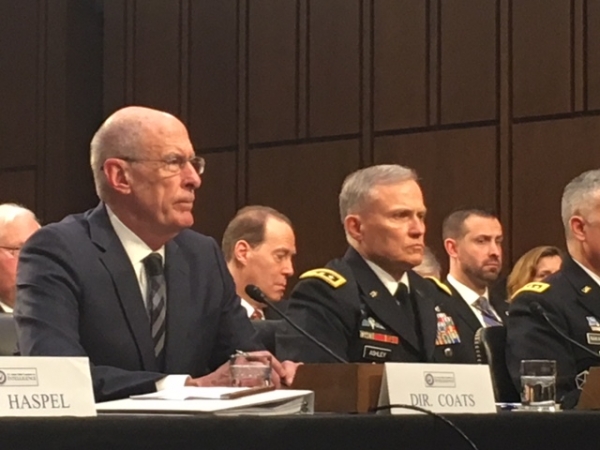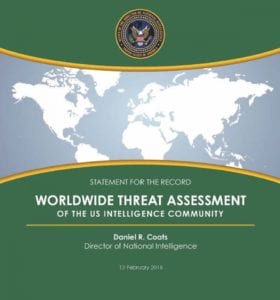By Glynn Wilson –
The top cabinet leaders in charge of every United States intelligence agency, all appointed by President Donald J. Trump and confirmed by the Senate, directly contradicted the president’s claims about the existence of a national security threat on the country’s Southern border Tuesday in testimony before the U.S. Senate Intelligence Committee. They did cite Russian election tampering as one of the big four threats.
National Intelligence Director Daniel R. Coats delivered the legally required annual Worldwide Threat Assessment to Congress and outlined the real national security threats facing the country.
The immigration situation on the U.S.-Mexico border is never mentioned as a crisis or a national security threat in the report, undercutting Trump’s public claims and his continuing threat to shutdown the government again in two weeks if Congress doesn’t allocate $5.7 billion for a wall. The president has even claimed he has the power to declare a national emergency and build a wall from money already allocated by Congress to fund the military, even though his entire own national security team doesn’t consider it a threat.
In his opening statement and in the report, cyber-security threats from China and Russia are highlighted as the key threats to national security. While not much of the testimony focused on environmental threats, climate change due to global warming from the burning of fossil fuels is also highlighted in a major section of the report.
While there was no focus on the recent government shutdown, which left the nation vulnerable with more than 800,000 government workers not on the job at their computers and critical private contractors not getting paid, the report concluded that China is now positioned to conduct effective cyberattacks against American infrastructure, including the ability to cut off natural gas pipelines.
The assessment argues that Russia’s capability to conduct cyber-espionage to influence political campaigns is about the same as it was in 2016 during the U.S. presidential election, but an emerging larger concern is that “Moscow is now staging cyberattack assets to allow it to disrupt or damage U.S. civilian and military infrastructure during a crisis.” A government shutdown could very well be considered a crisis leaving the nation’s infrastructure vulnerable to attack.
The capability of Russia to plant malware in the country’s electricity grid and take out power systems is specifically mentioned in the report, and intelligence gathering shows that Russia already has the capability to bring the power grid down “for at least a few hours.”
The staff report “paints a picture of threats vastly different from those asserted by Mr. Trump,” according to New York Times coverage.
While the president has clearly expressed an affinity toward Russia and its dictator Vladimir Putin time and time again since his election, and Special Counsel Robert Mueller is investigating Russia’s meddling in the 2016 election to help Trump get elected, the staff intelligence chiefs say Russia is clearly a potentially ongoing “disruptive threat” to American democracy.
While Trump has abandoned long-established U.S. national security protocols by meeting with North Korean dictator Kim Jong-un and has said he will take care of the nuclear threat to South Korea and the U.S. by “talking” to the dictator, the intelligence assessment of global threats concludes that North Korea is “unlikely to give up” all of its nuclear stockpiles and capabilities.
“We currently assess North Korea will seek to retain its W.M.D. capability and is unlikely to completely give up its nuclear weapons and production capability,” Coats told the Senate Intelligence Committee. “Its leaders ultimately view nuclear weapons as critical to regime survival.”
CIA Director Gina Haspel also testified that the North Korean government “is committed to developing a long-range nuclear-armed missile that would pose a direct threat to the United States.”
The report also challenges Trump’s insistence that the Islamic State has been defeated, a key rationale for his decision to recommend that U.S. troops be pulled out of Syria. The terrorist group, according to the report, “still commands thousands of fighters in Iraq and Syria.”
While Trump pulled the U.S. out of a nuclear deal with Iran negotiated by the Obama administration and he has claimed Iran is still trying to build a nuclear weapons program, the CIA and other intelligence agencies say that does not appear to be the case. Iran is “not currently undertaking the key nuclear weapons-development activity” needed to make a bomb, according to the report and Congressional testimony.
“We do not believe Iran is currently undertaking the key activities we judge necessary to produce a nuclear device,” Mr. Coats said, but he added that Iranian officials have “publicly threatened to push the boundaries” of the nuclear deal it struck with world powers in 2015 if it did not see the benefits it expected.
Summary Remarks
In his opening remarks, Coats testified that the U.S. faces “significant changes in the domestic and global environment that have resulted in an increasingly complex and uncertain world, and we must be ready to meet 21st century challenges and recognize emerging threats.”
“The composition of the current threats we face is a toxic mix of strategic competitors, regional powers, weak or failed states, and non-state actors using a variety of tools in overt and subtle ways to achieve their goals,” he said. “The scale and scope of the various threats facing the United States and our immediate interests worldwide is likely to further intensify this year.”
He began his opening statement by talking about election security, what he called “a top priority for the Intelligence Community.”
“We assess that foreign actors will view the 2020 U.S. elections as an opportunity to advance their interests. We expect them to refine their capabilities and add new tactics as they learn from each other’s experiences and efforts in previous elections,” he said. “On the heels of our successful efforts to protect the integrity of the 2018 mid-term elections, we are now focused on incorporating lessons learned in preparation for the 2020 elections.”
He called threats from China, Russia, North Korea and Iran “the big four,” and said China’s actions “reflect a long-term strategy to achieve global superiority.”
“Beijing’s global ambition continues to restrict the personal freedoms of its citizens, while strictly enforcing obedience to Chinese leadership, with very few remaining checks on President Xi’s power,” Coats testified. “In its efforts to diminish U.S. influence and extend its own economic, political, and military reach, Beijing will seek to tout a distinctly Chinese fusion of strong-man autocracy and a form of western style capitalism as a development model and implicit alternative to democratic values and institutions.”
These efforts will include the use of its intelligence and influence apparatus to shape international views and gain advantages over its competitors – including the United States. China’s pursuit of intellectual property, sensitive research and development plans, and U.S. personal data, he said, “remains a significant threat to the U.S. government and private sector.”
“Whereas with China, we must be concerned about the methodical and long-term efforts to capitalize on its past decade of a growing economy and to match, or overtake our superior global capabilities,” Coats said, “Russia’s approach relies on misdirection and obfuscation as it seeks to destabilize and diminish our standing in the world.”
Even as Russia faces a weakening economy, Coats said, the Kremlin is stepping up its campaign to divide Western political and security institutions and undermine the post-WWII international order.
“We expect Russia will continue to wage its information war against democracies and to use social media to attempt to divide our societies,” he said.
Russia’s attack against Ukrainian naval vessels in November is just the latest example of the Kremlin’s willingness to violate international norms to coerce its neighbors and accomplish its goals, he said.
“We also expect Russia will use cyber techniques to influence Ukraine’s upcoming Presidential election. The Kremlin has aligned Russia with repressive regimes in Cuba, Iran, North Korea, Syria, and Venezuela, and Moscow’s relationship with Beijing is closer than it has been in many decades,” Coats testified.
The Kremlin is also stepping up its engagement in the Middle East, Africa and Southeast Asia, using weapons sales, private security firms, and energy deals to advance its global influence, he said.
China, Russia, North Korea and Iran are all advancing their cyber capabilities, he said, “which are relatively low-cost and growing in potency and severity.”
This includes threatening both minds and machines in an expanding number of ways, such as stealing information, attempting to influence populations, or developing ways to disrupt critical infrastructures, he testified. “As the world becomes increasingly interconnected, we expect these actors, and others, to rely more and more on cyber capabilities when seeking to gain political, economic, and military advantages over the United States and its allies and partners.”
Previous Original Coverage
Congressional Leaders Announce Short-Term Deal to Reopen Federal Government, Averting Disaster
Trump Shutdown National Security Threat Widens, Potentially Leading to Economic Recession
















Very useful summary of the hearing.
There can be no doubt that our president is delusional and a traitor motivated by personal profit and personal gain. Where are the eunuch GOP senators regarding this-if this were Obama, no doubt he would have been impeached and convicted by now. Cowards!